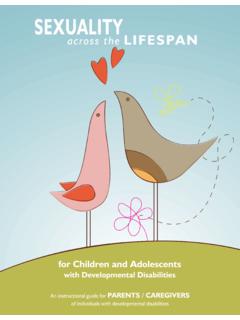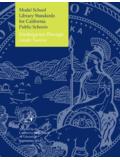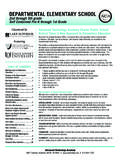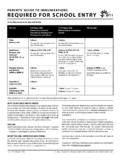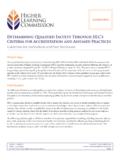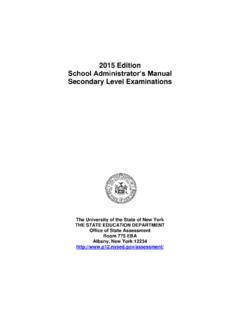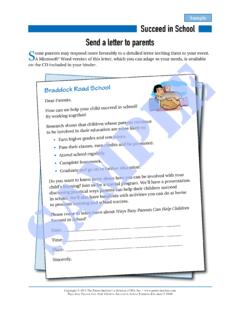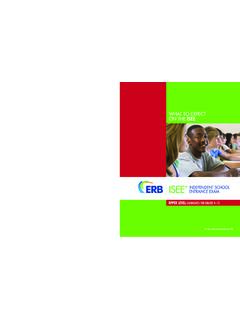Transcription of Disability Awareness Through Language Arts and Literacy
1 Disability Awareness Through Language arts and Literacy Resources for Prekindergarten and Elementary school 2012 FLORIDA DEVELOPMENTAL DISABILITIES COUNCIL, INC. This guide is the property of the Florida Developmental Disabilities Council and the Department of Health and Human Services. We encourage the widespread use and dissemination of the materials contained within this guide. Please contact with any questions or comments you may have pertaining to this guide. Disability Awareness Through Language arts and Literacy Resources for Prekindergarten and Elementary school Marty Beech, 2012 FLORIDA DEVELOPMENTAL DISABILITIES COUNCIL, INC.
2 Page | ii A C K N O W L E D G E M E N T S With appreciation for the wisdom and guidance of the following members of the Advisory Committee: Jeanne Boggs Parent, Leon County Kathy Burton Program Specialist, Bureau of Exceptional Education and Student Services, Florida Department of Education Christine Duff Teacher, Exceptional Student Education, Lake Brantley High school , Seminole County Jennifer Faber State school -Age Services Coordinator, Florida s Office of Early Learning Erika Hall Program Specialist, Just Read Florida, Florida Department of Education Jenny Harry Program Specialist, Bureau of Exceptional Education and Student Services, Florida Department of Education Charlotte Johnson-Davis Program Specialist, Just Read Florida, Florida Department of Education April Katine Project Manager.
3 Florida Developmental Disabilities Council, Inc. Barbara Krakower Facilitator, Florida Inclusion Network, Broward County Paula Marshall Human Resources Developer, Florida Diagnostic and Learning Resources System, Miccosukee Associate Center Anne McHugh Inclusion/Behavior Specialist, Early Learning Coalition of Pasco and Hernando Counties Patti McMullen Teacher, Fourth Grade, Buck Lake Elementary school , Leon County Amanda Moore State Inclusion Network Coordinator, Florida s Office of Early Learning Sara Romine Project Monitor, Florida Developmental Disabilities Council, Inc. Nancy Stokely Principal, Woodville Elementary school , Leon County Stan Weser Facilitator, Florida Inclusion Network, Florida Gulf Coast University Jean Woodard Parent, St.
4 Lucie County Art work reprinted with permission of the artist, Martha Perske, from the book Perkse, R. (1998). Perske: Pencil Portraits 1971-1990. Nashville, TN: Abingdon Press. The links included in this document are provided as a convenience and for informational purposes only; they do not constitute an endorsement or approval by the Florida Developmental Disabilities Council of any of the products, services, or opinions of the corporation, organization, or individual. Page | iii TABLE OF CONTENTS Introduction .. 1 References .. 2 Disability Awareness .. 3 How People Are Alike and Different .. 4 Positive Attitudes and Productive Relationships .. 4 Disability Etiquette for Children.
5 5 Communication Skills .. 5 Friendships and Productive Relationships .. 6 Information about Disabilities .. 6 Disability Resources .. 7 Contributions of Individuals with Disabilities .. 7 References .. 8 Language arts & Literacy Activities .. 9 Reading and Listening .. 10 Shared Reading .. 10 Directed Reading .. 12 Story Elements .. 16 Character Study .. 18 Reflecting on Reading .. 20 Writing and Speaking .. 22 Tell a Story .. 22 Share Information .. 24 Share an Opinion .. 26 Using Children's Literature to Increase Disability Awareness .. 29 About the Books .. 30 Text Complexity, Grade Levels, and Lexile Bands .. 30 Book Selection .. 31 References .. 32 Books for Prekindergarten: Ages Three and Four.
6 33 Books for Kindergarten and Grade One .. 37 Books for Grades Two and Three .. 40 Books for Grades Four and Five .. 44 Page | iv Lesson Plans .. 49 What s in the Lesson Plans? .. 50 Lesson Plans for Selected Books .. 51 Prekindergarten, Ages Three and Four .. 51 Kindergarten and Grade One .. 59 Grades Two and Three .. 68 Grades Four and Five .. 79 Additional Resources .. 97 Books for Summer Reading .. 98 Prekindergarten: Ages Three and Four .. 98 Kindergarten and Grade One .. 100 Grades Two and Three .. 102 Grades Four and Five .. 104 Follow-Up Activities for Families .. 106 Learn from Friends and Family .. 106 Participate in Community Events .. 106 Explore Parks and Playgrounds.
7 106 Investigate Accessibility in the Community .. 107 Watch a Movie .. 107 Read Books Together .. 107 Florida Resources for Guest Speakers .. 108 Preparation .. 108 Resources .. 108 Multimedia Resources .. 111 Information Resources .. 114 Florida Resources .. 114 National Resources .. 116 Disability Awareness Activities and Additional Resources .. 117 Appendix .. 119 Standards and Benchmarks Addressed in Lesson Plans .. 120 Florida s Early Learning and Developmental Standards for Three-Year-Olds .. 120 Florida s Early Learning and Developmental Standards for Four-Year-Olds .. 121 Common Core Standards: English and Language arts .. 122 Lists of Books by Disability and Theme.
8 128 Feedback, Please .. 132 Feedback from the Children .. 132 Feedback from Parents and Educators .. 134 Page | 1 INTRODUCTION INTRODUCTION IN C L U S IO N : A G U ID IN G P R IN C IP L E Full inclusion of individuals with developmental disabilities, into their schools and communities, is the cornerstone of a good and safe quality of life. By developing meaningful relationships with friends, peers, families, and fellow citizens, individuals with developmental disabilities will live a full and rewarding life. (Florida Developmental Disabilities Council, Inc. , 2008) Young children come in contact with people with disabilities every day. Most children don t even notice the differences.
9 But when children don t understand why a person is different, they may make fun of that person or ask inappropriate questions. As children grow up, they develop their attitudes and feelings toward people with disabilities by watching and listening to family members, teachers, peers, and people in the community. The home and the classroom are ideal places to increase children s understanding of disabilities and teach them how to relate and interact in positive, accepting, and productive ways. Page | 2 Disability Awareness Through Language arts AND Literacy Inclusive schools provide rich opportunities for children to work and play together and support children with disabilities as they go to school .
10 In Buster and the Amazing Daisy (a book described on page 44), when Daisy worries that she doesn t belong in the regular school , her new friend Laurel assures her, I think you belong here, Daisy.. Yeah, I know you do. (Ogaz, 2002, p. 57). Dr. Amy Milsom suggests that the most effective way to change behavior and reduce harassment and other negative experiences is Through specific activities and experiences that are intentionally designed to increase knowledge and improve attitudes toward persons with disabilities (2006). Parents and teachers should make sure that these activities occur frequently throughout the year. In addition, children in Florida can participate in their school district s celebration of Disability History and Awareness Weeks each October.


